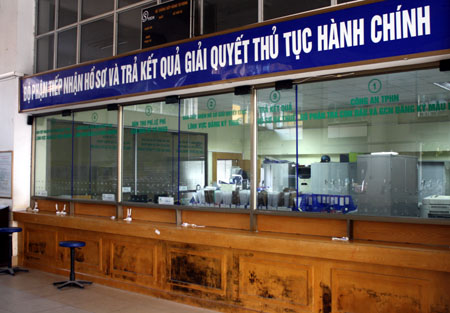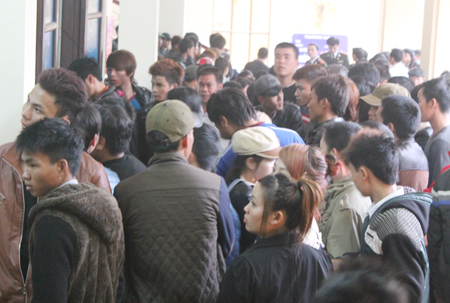
Chinh asked: "Have you guys caught any thieves or burglars in the past 10 years?" The four replied: "No, sir, it's extremely safe here."


"If things are that great, why do we need so many people to guard us?" Chinh thought. He was still wondering when he visited the library and met the school librarian.
The spacious library was really impressive, apart from the fact that it had no books. The Party secretary asked the librarian: "What do you do on a daily basis?"
The librarian replied: "I get the newspapers and deliver them to the principal."
The official then asked another member of library staff working in archives the same question: "What do you do?".
The staff member replied: "I deliver the newspapers to the library."
In the school's health check-up room, he noticed that the entry book only recorded two student visits for the entire year - both for headaches.
"What a dreadful system," he shouted.
He's right. There are an excessive number of public staff on the payroll in many towns and cities across Viet Nam.
In the Hong Hai ward of Ha Long City, there are 475 public officers on the public payroll. In Mao Khe town of Dong Trieu District in Quang Ninh Province, the number is 639.
According to Chinh, even an island commune in the province with just 200 houses has to accommodate more than 100 public servants.
"Most of the provincial budget is spent on the administrative system, what do we have left for development? How can the people tolerate this?" he said.
The story in Quang Ninh Province is alarming. At the provincial level, many efforts have been made to streamline the system, but no one seems sure if progress is being made.
The Government estimates that at present there are roughly 281,714 on the State payroll, people who work for government offices, administrative offices and Vietnamese representative offices abroad.
This number excludes those who work for the Ministry of Public Security, Ministry of Defence, those on the State payroll at the communal level and public-service units.
According to a recent report from the Ministry of Internal Affairs, the 130,000 hamlets across the nation employ more than 570,000 people.
The Ministry estimates that there are 900,000 non-specialised officers at the hamlet level who also receive allowances from the public budget, in other words, paid for by citizens.
A report from the Finance Ministry released a year ago suggested there were at least eight million people at all levels on the state payroll nationwide, including current staff, retirees and those who receive allowances and financial support due to past contributions.
That means there's one public servant for every 11 people.
Pham Duy Nghia, from the Fulbright Economic Teaching Programme, compares the system to the Matryoshka doll of Russia, a set of wooden dolls of decreasing size placed inside each other. This means the upper level is organised the same way as the lower level, urban the same as rural, ward the same as commune.
Nghia said even at the central level, there are too many people who serve as deputies. "The reason is that we don't give enough authority to those at the lower level. The boss has to do it all," he said.
He said the number of deputy ministers in each ministry could be slashed from six to one or two if departmental and administrative leaders under that ministry were given more responsibility.
Similar to businesses that deliver products to consumers, the Government has to deliver public services to the people, such as residency, permits, business, property registration, licences of all descriptions and so on.
According to the amended Constitution, the Government, can divide the system into two separate groups: one making policy (policy makers) and the other executing that policy (public staff and officers).
This clear cut-line is meant to improve the quality of policies and, hopefully, the professionalism of public staff.
The amended Constitution is the foundation that allows us to reshuffle and revamp the public governance system, which has been overloaded for so many years.
In February, the Ministry of Home Affairs suggested gradual reduction of 100,000 public staff. It caused a huge public debate.
The Party chief in Quang Ninh is clearly aware of the situation. Can we expect this province to lead the way? Keep your fingers crossed. — VNS
 Vietnam's economy slowly recovers: Gov't report (24/05/2014)
Vietnam's economy slowly recovers: Gov't report (24/05/2014)
 More Jobs to be Created in 2014 (23/03/2014)
More Jobs to be Created in 2014 (23/03/2014)
 Climate change committee targets green growth (22/02/2014)
Climate change committee targets green growth (22/02/2014)
 Business survey stresses growing domestic confidence (05/01/2014)
Business survey stresses growing domestic confidence (05/01/2014)
 Further Pushes for Stronger Economic Restructuring (08/12/2013)
Further Pushes for Stronger Economic Restructuring (08/12/2013)
 Vietnam Ranks 99th for Ease of Doing Business in New Report (02/11/2013)
Vietnam Ranks 99th for Ease of Doing Business in New Report (02/11/2013)
 Stable prices key to better living (15/10/2013)
Stable prices key to better living (15/10/2013)
 Remittances take their toll on economy (08/09/2013)
Remittances take their toll on economy (08/09/2013)
 Co-operative ventures between the university and enterprises key to competitiveness of Vietnamese products (16/08/2013)
Co-operative ventures between the university and enterprises key to competitiveness of Vietnamese products (16/08/2013)
 Environmental protection awareness alarmingly low among enterprises (12/07/2013)
Environmental protection awareness alarmingly low among enterprises (12/07/2013)